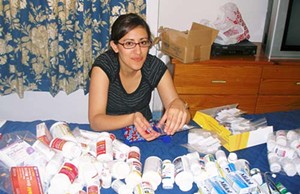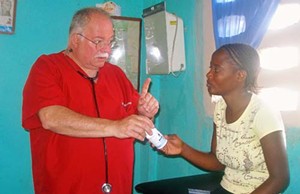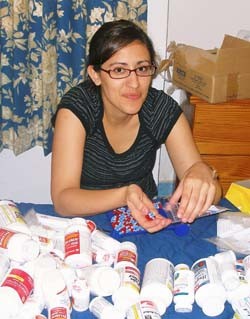
With all the poverty that exists in the United States Brent De Land, who founded the local nonprofit Haitian Development Fund, sometimes doesn’t know how to ask people to give his organization money for its health clinic in Haiti.
However, he reasons, where there’s a need we should fill it no matter where it is in the world, “if it’s in South Carolina, Haiti, or east Springfield.” Haiti, he believes, just happens to be his calling.
It also happens to be one the neediest nations in the world. Just consider that Haiti spends 8 percent of its gross domestic product on healthcare, compared to 15.3 percent in the U.S. And whereas malaria, HIV/AIDS, pneumonia, and diarrheal diseases account for 45 percent of deaths among Haitian children under age 5, according to the most recent mortality data from the World Health Organization, these conditions represent less than 1 percent of under age 5 deaths here in the U.S. Even when they survive to adulthood, the average Haitian can expect to live just 55 years; the average American, 75 years.
For this reason, De Land started HDF, formally organized in 2002, and its Sarthe Neighborhood Medical Clinic located in Port-au-Prince, the nation’s capital. Despite personnel taking up a third of HDF’s projected operating budget of $33,790, the 2,500-square-foot clinic has experienced over 1,000 patient visits per month this year.
Through May 2009, the clinic has had 55,237 total patient visits at a cost of what roughly equals $1.50 per person. If that weren’t enough reason to be beat their chests, De Land, a trained medic and radiologic technologist and former president of Springfield College in Illinois, especially takes pride in the fact that everyone on the clinic’s part-time staff of seven — from the medical director, Dr. Moise Cely, to the medical assistants, translators, nurses, lab assistant and custodian — is Haitian.
“I think it’s important that that patients not see the clinic as a creation of central Illinois do-gooders but as something that empowers Haitians to help Haitians,” he says.
De Land visits the clinic about twice a year, often with a group of volunteers, for one week to check in, restock supplies, and to give central Illinoisans a taste of life in a poor country. During HDF’s most recent visit, in May, De Land was joined by Kari Colgan, a recent nursing graduate from Peoria, and Natalie Moore, a 2006 graduate of Glenwood High School and a fourth-year student at the St. Louis College of Pharmacy.

“It was a lot to take in,” Moore says of arriving in the Western Hemisphere’s poorest country. “The smog, the pollution — it was definitely sensory overload.”
Equally overwhelming was the pace and workload at the Sarthe clinic. Volume at
the clinic tends to spike when the neighborhood residents find out that De Land
and other blancs — the Haitian Creole word for white people — are coming to town because they bring medicine, donated T-shirts for the kids,
and toothbrushes for the clinic’s dental program, Spit-n-Grin. With Moore’s and Colgan’s assistance, the clinic was able to see 93 patients more patients over May
2008.
In addition to the clinic’s regular services, HDF also offers a wellness program for pregnant moms, which provides the women with prenatal vitamins, hemoglobin and STD tests, and hygiene kits as well as follow-up care for three months after the baby is born. De Land is current seeking grants to maintain the wellness program, in which 395 people participated in the last program year. It costs $10,000 a year to run.
Aside from the financial challenges, which, because of the worldwide recession are the most acute this year since the clinic’s inception, De Land says overcoming cultural differences can be difficult, particularly for first-timers. During their recent trip, for example, a woman hadn’t fed her newborn in three days because Haitians customarily do not feed their children until after they’ve bathed and the woman simply hadn’t had an opportunity to, she told workers at the clinic.
“That’s a cultural thing. As an American, you want to scream but the bottom line is you have to get the baby fed,” De Land says.
Other cases didn’t have such happy endings. Another visitor to the clinic was a mother whose baby
had a condition known as “failure to thrive” and also had not nursed in four days. “We felt so helpless,” says Moore. “It’s sad knowing that baby is probably not alive right now.”
In researching the country before her trip Moore says people had two things to say about mission trips to Haiti: first, that it’s life changing and second, that you’ll fall in love with the country. She found both to be true. She adds that witnessing how Haitians live helped put life at home into perspective.
“Poverty here in the U.S. is nothing compared to the slums of Port-au-Prince,” she says. “You can’t help but be grateful.”
Contact R.L. Nave at [email protected]

















